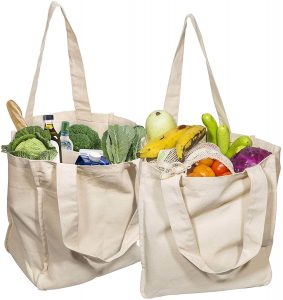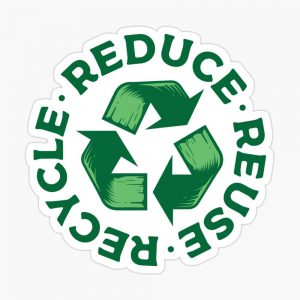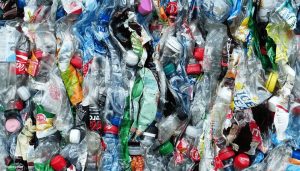Heatwaves, abrupt weather changes, and land pollution are affecting millions of people globally. From floods to hot spells and water shortages to blackouts, climate change is in action and it’s about time we do something about it.
As an individual, here are 8 environmentally friendly habits that you can adopt to save the planet!
Eco-Friendly Habits to Adopt
Below are 8 eco-friendly habits that are practical, and effective. We have made the list based on scientific evidence and popular opinions of environmentalists around the world.
- Carry a Cloth Bag and Basic Cutlery
- Plant Trees
- Reduce, Reuse, Recycle
- Consume Less Plastic
- Email Mindfully
- Buy Responsibly
- Use LED Bulbs
- Tweak Your Diet
Now let’s talk about each of the above points and how you can follow them to save the planet.
1. Carry a Cloth Bag and Basic Cutlery

According to tatapower, around 500 billion plastic bags are used globally. If you use paper bags instead, it’s a comparatively better option but manufacturing paper bags requires large quantities of wood.
So what to do? It is advisable to use cloth or jute bags. These are made from renewable and natural fibers, they last long and come in trendy colors and designs.
Another thing to carry in your bag is a glass or metal box and a small thermos or water bottle (spoons, knives, and forks can be a bonus).
That will help you avoid taking plastic and styrofoam boxes when you buy fast food. You can pack food in your box or if you order coffee, you can get it filled in your thermos instead of getting a paper or styrofoam cup.
2. Plant Trees

Trees absorb carbon dioxide and release oxygen necessary for life. They offer shade, protection, a healthy ecosystem, and serve as food sources for many animals and insects.
Planting a tree or small plants inside and outside your home will help the planet, as collective plantation efforts can greatly increase greenery in your region and help reduce rising temperatures.
Trees also reduce stormwater runoff, erosion, and pollution, decreasing the effects of flooding.
According to TIME magazine, 1 trillion trees can absorb around 200 gigatons of carbon (over their lifetime). That is equal to more than 43 billion car emissions (annually).
Considering global warming, massive floods, heatwaves, and the loss of precious animals, planting a single tree can be a great step at an individual level.
3. Reduce, Reuse, Recycle

The 3Rs are popular terms you will hear when it comes to living a sustainable life. From reducing the number of things you buy to reusing items and then recycling materials, the 3Rs offer a positive cycle to save the planet.
As an individual, try to limit the number of products you buy so you can prevent waste and clutter. If something gets damaged like your shoes, bags, clothes, or any other item, try to repair it.
Taking care of your belongings and doing timely repairs, can also help increase their life, saving your money, time, and the environment.
If an item cannot be repaired further, dispose it responsibly, and try to recycle at home as much as possible so the end waste you generate is minimized.
According to Statistica, by 2050, worldwide waste generation (municipal solid waste) is expected to increase by roughly 70% and reach 3.4 billion metric tons.
We can reduce that waste by following the 3Rs!
4. Consume Less Plastic

The food we eat comes wrapped in plastic, and the soap we use to wash our hands is also packaged in plastic. With our increasing dependence on a material, that takes hundreds of years to decompose, we are in trouble and it’s time we work on it.
Taking things slowly and switching to alternatives to plastic is a great step that every individual can take. From using your cloth shopping bag and cutlery as explained earlier to buying items from the open market like fruits, vegetables and meat can greatly help.
If you shop from the supermarket where everything is already packaged, you will find it hard to avoid plastic.
Switch to shops that either offer plastic-free packaging or use recycled plastic and you are on your way to saving the planet.
There are multiple brands today that use paper bags instead of plastic ones so you can opt for them when you shop.
5. Email Mindfully!

Here comes an unconventional point that is quite easy to follow if you are a beginner. Send fewer emails and clear your inbox regularly, here is why!
According to News18, every day 280 billion emails are sent in the world! Sending an email has a 4-gram carbon footprint on average
The total carbon footprint can be as high as 410 million tonnes of CO2 per year, according to the mobile app, Greenly.
Another thing to consider is that sending, storing, and even deleting emails uses a computer, a network, servers, etc.
Thus, considering the global impact of emails, try to send fewer emails, and delete emails that are not needed.
6. Buy Responsibly

When you go shopping, you buy from multiple brands, some of which work sustainably and some don’t. Some brands, like Generations, use organic cotton, which is good for the planet and farmers.
They reuse plastic and also allow customers to get customized pieces made using fabric leftover from their previous collections at their factory outlet store.
Another sustainable brand that offers daily-use items is Code Green. It offers eco-friendly products for skin care and daily use, including cloth bags, bamboo toothbrushes, tooth powders, thermos, take-away cups, shampoo bars, etc.
7. Use LED Bulbs

According to drawdown, if everyone used LED bulbs instead of other options, we can save $5 trillion over equipment lifetime, and avoid nearly 18 gigatons of CO2 emissions from 2020 to 2050.
LED bulbs are a great alternative to regular incandescent light bulbs and compact fluorescent lights (CFL).
They are made of non-toxic materials, are energy efficient, last longer, and are durable. LEDs last 6 times longer than conventional bulbs lowering carbon emissions due to their long life.
As they don’t need to be replaced frequently, that minimizes waste and helps save money. Compared to traditional bulbs they are 90% more energy-efficient saving you from paying high electricity bills.
8. Tweak Your Diet

Now, this step might be hard for meat lovers, but a slight lifestyle modification can improve your health and save the planet!
Around 40% of the Earth’s land is used for agriculture including crops and livestock and 35% of all greenhouse gas emissions come from food production.
57% of these emissions come from animal production therefore limiting our reliance on livestock has become the need of the hour.
According to Healthline, a diet consisting of fruits, veggies, grains, nuts, legumes, seeds, items derived from these foods, less meat, and dairy is associated with better health. Therefore, as individuals, limiting our reliance on livestock is actually a win-win!
Take Action, One Step at a Time!
As an individual, you might not value the power you hold, but small efforts can act as drops in the vast ocean.
If every person on the planet tries to play his/her role, we can beat climate change, reduce global warming, and get our planet back to its original state.
Climate activist Greta Thunberg once said “All we have to do is wake up and change! “
In today’s age, we have solutions and data to see the way ahead. All we need to do is start taking action, one step at a time.















